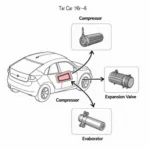Considering a career in funeral service? This field offers a unique opportunity to provide comfort and support to grieving families during one of the most challenging times in their lives. It’s a career path that requires compassion, empathy, and a genuine desire to help others. But what does it really entail, and is it the right fit for you?
Exploring the Diverse Roles within Funeral Service
Funeral service isn’t a one-size-fits-all profession. There are various roles and specializations within this field, each requiring a different set of skills and interests. From embalming and restorative art to funeral directing and grief counseling, the options are surprisingly diverse. This section will delve into some of the key areas within funeral service to help you understand what each entails.
Funeral Director: The Orchestrator of Arrangements
The funeral director is the primary point of contact for families, guiding them through the process of arranging funeral services. This involves everything from handling legal paperwork and coordinating logistics to providing emotional support and ensuring that the family’s wishes are honored.
Embalmer: Preserving Dignity and Memory
Embalming is a specialized practice focused on preserving the deceased’s body. This involves using specific techniques and chemicals to slow down decomposition and restore a natural appearance for viewing and memorial services. It requires a strong understanding of anatomy, chemistry, and sanitary practices.
Restorative Artist: Recreating a Lifelike Image
Restorative art is a highly skilled practice within funeral service that focuses on restoring the appearance of the deceased after trauma or illness. This requires artistic talent, meticulous attention to detail, and a deep understanding of facial anatomy and reconstruction techniques.
Grief Counselor: Providing Emotional Support in Times of Loss
Grief counselors provide emotional support and guidance to individuals and families coping with the loss of a loved one. They offer a safe space for grieving individuals to process their emotions, develop coping mechanisms, and navigate the challenges of bereavement.
Is Funeral Service the Right Career Path for You?
Choosing a career in funeral service is a significant decision. It requires a specific set of personality traits and a genuine desire to serve others during a difficult time. Consider these key qualities:
- Compassion and Empathy: Are you naturally empathetic and able to connect with others on an emotional level?
- Emotional Resilience: Can you handle emotionally charged situations and maintain composure under pressure?
- Strong Communication Skills: Can you communicate effectively and respectfully with grieving families?
- Organizational Skills: Can you manage multiple tasks and details simultaneously while maintaining accuracy and attention to detail?
- Attention to Detail: Are you meticulous and detail-oriented, ensuring that every aspect of the service is handled with care and precision?
What are the Educational Requirements for a Career in Funeral Service?
Most states require an associate’s degree in mortuary science. These programs cover a range of topics, including embalming, restorative art, funeral directing, grief counseling, and business management. Additionally, licensure is typically required, which often involves passing a national board exam and completing an apprenticeship.
The Rewards of a Career in Funeral Service
While challenging, a career in funeral service can be incredibly rewarding. You have the opportunity to make a real difference in people’s lives during a time of profound grief and loss. Knowing that you’ve helped families navigate a difficult period and honor their loved ones can provide a deep sense of purpose and fulfillment.
 Grief Counselor Comforting a Client
Grief Counselor Comforting a Client
Conclusion: A Career with Meaning and Purpose
Choosing a career in funeral service offers a unique opportunity to combine compassion, skill, and a genuine desire to serve others. From funeral directing to embalming and grief counseling, this field offers diverse roles for individuals seeking a meaningful and rewarding career path. If you’re drawn to a profession that makes a tangible difference in people’s lives, funeral service might be the right fit for you.
FAQ
- What is the average salary of a funeral director? Salaries vary based on location and experience, but the median annual wage is typically around $50,000 – $70,000.
- How long does it take to become a licensed funeral director? It typically takes 2-4 years, including completion of an associate’s degree program and an apprenticeship.
- What is the job outlook for funeral service professionals? The job outlook is projected to grow steadily in the coming years.
- What are the most challenging aspects of working in funeral service? The emotional toll of working with grieving families can be challenging. Maintaining a healthy work-life balance is crucial.
- What are the most rewarding aspects of working in funeral service? Knowing that you’re making a difference in people’s lives during a difficult time can be incredibly rewarding.
Related Articles
- Choosing the Right Funeral Home
- Understanding the Funeral Planning Process
- Coping with Grief and Loss
Need support? Contact us via WhatsApp: +1(641)206-8880, Email: [email protected], or visit our office at 456 Oak Avenue, Miami, FL 33101, USA. Our customer service team is available 24/7.


